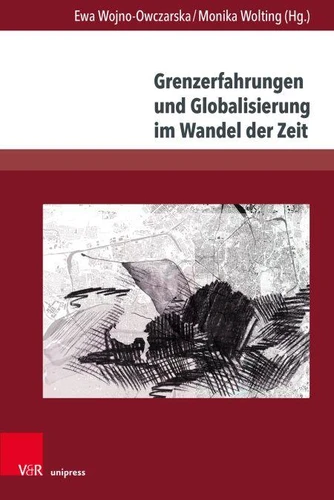Grenzerfahrungen und Globalisierung im Wandel der Zeit
Par : , , , ,Formats :
Disponible dans votre compte client Decitre ou Furet du Nord dès validation de votre commande. Le format PDF est :
- Compatible avec une lecture sur My Vivlio (smartphone, tablette, ordinateur)
- Compatible avec une lecture sur liseuses Vivlio
- Pour les liseuses autres que Vivlio, vous devez utiliser le logiciel Adobe Digital Edition. Non compatible avec la lecture sur les liseuses Kindle, Remarkable et Sony
 , qui est-ce ?
, qui est-ce ?Notre partenaire de plateforme de lecture numérique où vous retrouverez l'ensemble de vos ebooks gratuitement
Pour en savoir plus sur nos ebooks, consultez notre aide en ligne ici
- Nombre de pages391
- FormatPDF
- ISBN978-3-8470-1399-0
- EAN9783847013990
- Date de parution17/01/2022
- Protection num.pas de protection
- Taille6 Mo
- Infos supplémentairespdf
- ÉditeurV&R Unipress
Résumé
Aus unterschiedlichen wissenschaftlichen Perspektiven zeigen die Beiträger:innen des Bandes, auf welche Weise in ausgewählten literarischen Texten Fragen nach globalen Veränderungen beantwortet werden. Es wird davon ausgegangen, dass die deutschsprachige Literatur des 20. und 21. Jahrhunderts maßgeblich von Themen zunehmender weltweiter Verflechtungen in den Bereichen Wirtschaft, Politik und Kultur beeinflusst ist.
Dabei wird das Thema unter folgenden Aspekten beleuchtet: die ökonomischen Grundlagen menschlicher Existenz in Zeiten der Globalisierung, die Frage nationaler Identitätskonstrukte im Wechselverhältnis mit Alteritätskonstrukten, kultureller Vielfalt und (liberaler) Multikulturalität, die Komplexität von Geschichte und Geschichten im Spannungsfeld von Regionalität und Globalität, Kulturaustausch und Kulturkonflikte, Kultur- und Ideentransfer und nicht zuletzt nationale und transnationale Erinnerungsbilder. The contributors of this volume show in which manner issues on global changes are being answered in selected literary texts from different scientific perspectives.
They assume that the German literature of the 20th and 21st century is dominantly influenced by subjects of increasing global complexity such as economics, politics and culture. Here, the subject is analysed under the following aspects: the economic principles of human existence in times of globalisation, the question of national identity constructs in relationship to alterity constructs, cultural diversity and (liberal) multiculturalism, the complexity of history and stories in the tension field of regionality and globality, cultural exchange and cultural conflicts, culture transfer and idea transfer and last but not least, national and transnational remembrance images.
Dabei wird das Thema unter folgenden Aspekten beleuchtet: die ökonomischen Grundlagen menschlicher Existenz in Zeiten der Globalisierung, die Frage nationaler Identitätskonstrukte im Wechselverhältnis mit Alteritätskonstrukten, kultureller Vielfalt und (liberaler) Multikulturalität, die Komplexität von Geschichte und Geschichten im Spannungsfeld von Regionalität und Globalität, Kulturaustausch und Kulturkonflikte, Kultur- und Ideentransfer und nicht zuletzt nationale und transnationale Erinnerungsbilder. The contributors of this volume show in which manner issues on global changes are being answered in selected literary texts from different scientific perspectives.
They assume that the German literature of the 20th and 21st century is dominantly influenced by subjects of increasing global complexity such as economics, politics and culture. Here, the subject is analysed under the following aspects: the economic principles of human existence in times of globalisation, the question of national identity constructs in relationship to alterity constructs, cultural diversity and (liberal) multiculturalism, the complexity of history and stories in the tension field of regionality and globality, cultural exchange and cultural conflicts, culture transfer and idea transfer and last but not least, national and transnational remembrance images.
Aus unterschiedlichen wissenschaftlichen Perspektiven zeigen die Beiträger:innen des Bandes, auf welche Weise in ausgewählten literarischen Texten Fragen nach globalen Veränderungen beantwortet werden. Es wird davon ausgegangen, dass die deutschsprachige Literatur des 20. und 21. Jahrhunderts maßgeblich von Themen zunehmender weltweiter Verflechtungen in den Bereichen Wirtschaft, Politik und Kultur beeinflusst ist.
Dabei wird das Thema unter folgenden Aspekten beleuchtet: die ökonomischen Grundlagen menschlicher Existenz in Zeiten der Globalisierung, die Frage nationaler Identitätskonstrukte im Wechselverhältnis mit Alteritätskonstrukten, kultureller Vielfalt und (liberaler) Multikulturalität, die Komplexität von Geschichte und Geschichten im Spannungsfeld von Regionalität und Globalität, Kulturaustausch und Kulturkonflikte, Kultur- und Ideentransfer und nicht zuletzt nationale und transnationale Erinnerungsbilder. The contributors of this volume show in which manner issues on global changes are being answered in selected literary texts from different scientific perspectives.
They assume that the German literature of the 20th and 21st century is dominantly influenced by subjects of increasing global complexity such as economics, politics and culture. Here, the subject is analysed under the following aspects: the economic principles of human existence in times of globalisation, the question of national identity constructs in relationship to alterity constructs, cultural diversity and (liberal) multiculturalism, the complexity of history and stories in the tension field of regionality and globality, cultural exchange and cultural conflicts, culture transfer and idea transfer and last but not least, national and transnational remembrance images.
Dabei wird das Thema unter folgenden Aspekten beleuchtet: die ökonomischen Grundlagen menschlicher Existenz in Zeiten der Globalisierung, die Frage nationaler Identitätskonstrukte im Wechselverhältnis mit Alteritätskonstrukten, kultureller Vielfalt und (liberaler) Multikulturalität, die Komplexität von Geschichte und Geschichten im Spannungsfeld von Regionalität und Globalität, Kulturaustausch und Kulturkonflikte, Kultur- und Ideentransfer und nicht zuletzt nationale und transnationale Erinnerungsbilder. The contributors of this volume show in which manner issues on global changes are being answered in selected literary texts from different scientific perspectives.
They assume that the German literature of the 20th and 21st century is dominantly influenced by subjects of increasing global complexity such as economics, politics and culture. Here, the subject is analysed under the following aspects: the economic principles of human existence in times of globalisation, the question of national identity constructs in relationship to alterity constructs, cultural diversity and (liberal) multiculturalism, the complexity of history and stories in the tension field of regionality and globality, cultural exchange and cultural conflicts, culture transfer and idea transfer and last but not least, national and transnational remembrance images.



